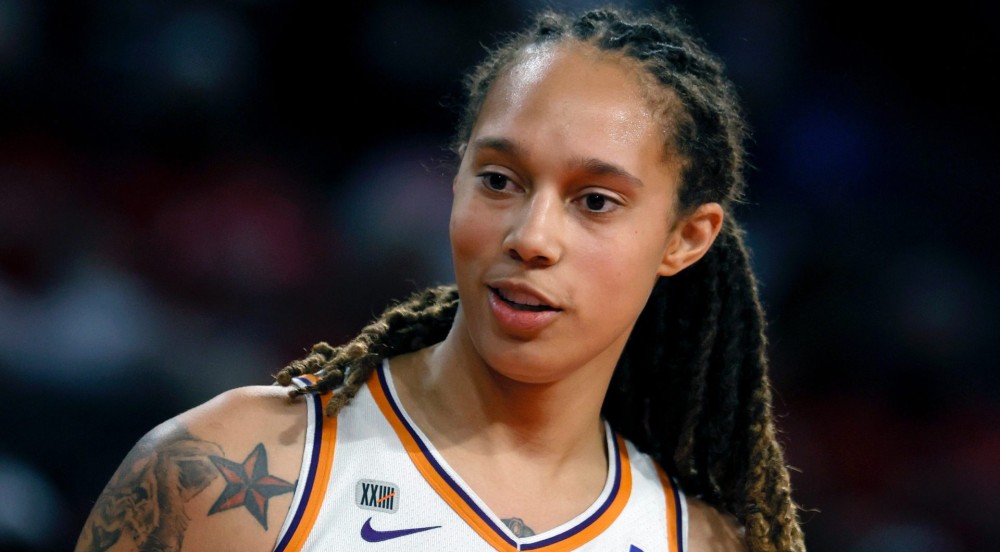WNBA star Brittney Griner was released from a Russian Penal colony on Dec.8, nearly a year after being “unjustly detained.”
Brittney Griner is home.
Four words that so many prayed for.
Four words that so many have been wanting to say for so long, unsure if the day would come anytime soon.
Her release is a joyful time that speaks to many groups, none more than the Black LGBTQ+ community which has been among her strongest supporters since she was detained on Feb. 17 at Sheremetyevo International Airport near Moscow.
Beyond Griner’s situation, one of the biggest fears those who belong to those groups have felt is that their value and self-worth don’t get nearly as much attention or the credit it deserves.
Griner’s plight in Russia brought many of those concerns and fears to life, raising questions as to how hard the United States was really working for her release.
“After months of being unjustly detained in Russia, held under intolerable circumstances, Brittney will soon be back in the arms of her loved ones,” said President Joe Biden from the White House, shortly after Griner’s freedom was secured. “And she should have been there all along.
He added, “This is a day we’ve worked toward for a long time. We never stopped pushing for her release.”
Maybe so, but there were still plenty of skeptics (and still are even after her release) among the Black LGBTQ+ community and its allies.
“I started to question if this was going to stay a priority of our own government,” Kierra Johnson, Executive Director of the National LGBTQ+ Task Force, told the 19th, a non-profit publication focused on gender, politics and policy. “Because [Griner] literally embodies the identities that are under greatest attack right now: Black, queer, woman.”
Indeed, the LGBTQ+ community has seen a rise in anti-LGBTQ+ policies which has factored in what has been an increase in incidents—some proving deadly—against members of the LGBTQ+ family. Last month, a gunman killed five and injured at least 25 others at an LGBTQ nightclub in Colorado Springs, Colorado.
The ever-changing political landscape doesn’t offer any assurances or indicators that things will get better, especially when you consider the potential domino effect of the right-leaning Supreme Court which may weigh in on some of these issues.
Considering the political winds of change have been blowing in more of an anti-LGBTQ direction, Griner’s release may very well be the game-changer needed. There will be more conversations and attention paid to issues of importance to members of the LGBTQ+ family, all of which revolve around diversity along with equitable inclusion.
Griner’s release has generated global interest beyond the basics of her being an American WNBA player who is now back home after getting caught up in a crooked, Draconian brand of Russian justice.
But the length of her detainment amid sketchy charges was a trigger of concern for the Black community as well.
“We know so many times in our history, and presently, people are arrested for things that they didn’t do or didn’t do in the way that they’ve been charged,” Victoria Kirby York, director of public policy and programs at the National Black Justice Coalition, told the 19th. “And there’s so much similarity in what was happening to Brittney abroad and what we experience at home.”
For now, there will be increased discussions about issues of importance to the LGBTQ+ community such as pay equity (the reason she was in Russia, to begin with, was because of the earning potential that existed there but not here in the United States) and mental health (After spending 10 months isolated from family, friends and loved ones, how will this impact Griner’s mental state upon transitioning back into her old-normal as an American).
Those issues are just the beginning of topics on deck to be talked about in the coming weeks and months, that serve as reminders about the truth that not enough folks are willing to discuss let alone embrace.
Those issues and freedoms they fight for, they’re not fighting for more LGBTQ+ rights. They’re fighting for human rights, the kind that we all should be championing.
Griner’s imprisonment and the subsequent fall-out from her release, are reminders of this.
By no means does Griner being freed fully address the still-lingering inequalities that members of the LGBTQ+ family face in today’s society.
But her release is a positive step in righting this long-standing societal wrong. Change the Game, Brittney.
Four more words we all need to get behind and support, right now.













